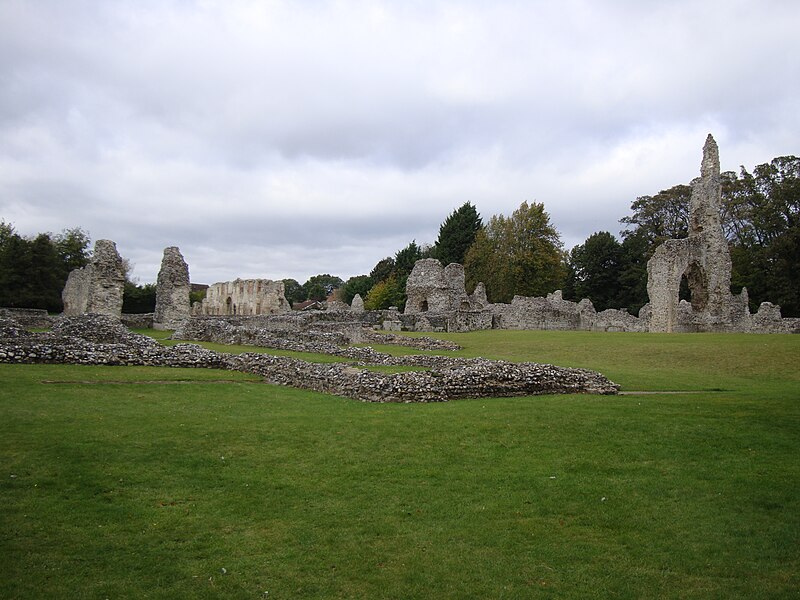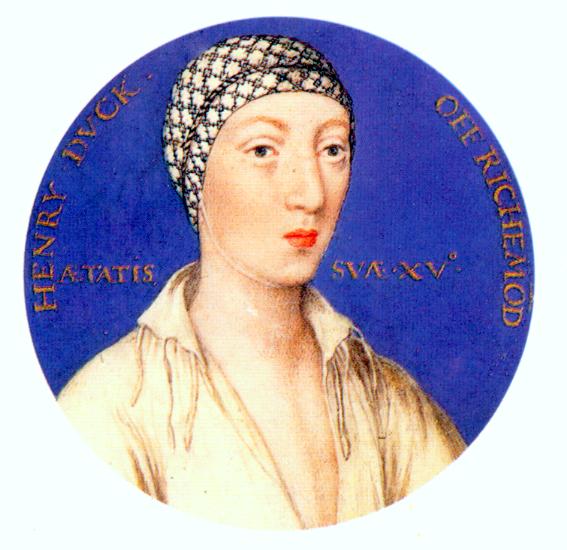 |
| Thetford Priory |
Norfolk
passed the post of Lord Treasurer on to his son in 1522. Two years
later the old duke died in May 1524, having served four kings and his son
Thomas was elevated to his father’s position. The Howards had kept their place
in the royal courts with a ruthlessness that was unrivalled. The hereditary
post as Earl Marshall transferred to the new duke at the
old duke’s death. Henry became Earl of Surrey in his father’s place.
In June 1524[i]
Henry and the rest of the family arrived at Thetford for the funeral and elaborate ceremonies transferring the Howard
responsibilities from the second to the third duke at the Priory where all the Howards were buried. The service and
ceremonies were conducted by the Bishop of Ely.
 |
| Earl of Oxford |
Thomas
inherited an annual income that varied from £3,000 - £4,000[ii];
an amount greatly in excess of the average peer’s income of £801[iii].
Life at Thetford Hall became increasingly more complex; the new duke took on
many of his father’s retinue along with his half-sister Anne, Lady Oxford,
relict of the 14th Earl, who had been dispossessed of her
possessions by the new Earl of Oxford, a second cousin of her husband’s.
Christmas
that year was celebrated with ducal magnificence and so many people arrived
that Tendring Hall was overcrowded. Thomas decided to transfer his main home to
Kenninghall and employed an army of builders to expand and extend the house
into an H shaped building with upwards of seventy rooms.
Changes
The poor and
indigent were not ignored by the new duke; hermits and gypsies were welcomed at
the Howard table. But Thomas retained in many of his lands the villenage of his predecessors, much to the disgust of his bondsmen who
complained that the duke treated them;
‘With
much more extremity than his ancestors did.’[iv]
From 1527
onward Norfolk was afflicted by an undiagnosed illness that was to plague him
for the rest of his long life[v].
He was prone to discussing his ailment with the king and council, giving them
details of his bowel movements. It possibly made him more cranky and remote
from his children
.jpg/800px-Remains_of_Butley_Priory_near_Abbey_Farm_(geograph_2578345).jpg) |
| Butley Priory gatehouse |
Henry’s
education now expanded to include subjects approved by the Humanists. His studies were focussed on the
liberal arts; rhetoric, Latin, moral philosophy, history, literature and the
scriptures. His favourite authors were Virgil and Martial. As a future courtier Henry learnt
French, Spanish and Italian, dancing and singing. Henry was a precocious
student and Norfolk often gloated over his son’s Latin translations when at
court.
Henry loved
hunting and his father indulged him while, at the same time, teaching his heir
his future responsibilities. Henry accompanied his father while Norfolk undertook
his duties as duke. On 16th September 1526 Norfolk went hunting with
his sons at Scuttegrove Wood in East Suffolk, spending the night at nearby Butley Priory. On the following day Henry was with the duke when he
ordered the desalination of the salt marshes at Hollesley.
The King’s Private Matter
 |
| Charles V |
Thomas
Howard was a hard man; he had to be to survive the vicissitudes of the Tudor
court; for over a decade he had been jousting for power with the low-born Thomas Wolsey and generally losing. When his niece Anne Boleyn[vi] became the king’s latest infatuation
Thomas found himself in favour and returned as a royal counsellor and
companion.
Anne was
canny enough not to give in to the king; she had no desire to be one of his
discarded mistresses. Even then she may have had marriage in mind putting her
in direct opposition to Wolsey who, even then, was considering a divorce for
his royal master. Rather than a scion of the Howard family, Wolsey had his eye
on a French princess to replace Queen Katherine whose continued failure to
produce an heir, other than Princess Mary, was of concern to both king and minister.
Wolsey asked
the pope Clement VII for an annulment of the marriage,
but the pope was not inclined to overturn the judgement of his predecessor[vii].
The matter rumbled on until Katherine’s nephew’s troops sacked Rome where they
found the pope in hiding. The Holy Roman Emperor’s control of the pope meant that his aunt’s annulment
was not the done deal that both Wolsey and the king had hoped. This failure to
produce a divorce from the faded and aging queen was to cost Wolsey dear.
Wolsey’s fall was to produce opportunities for one of his greatest enemies.
The King’s Son
 |
| Henry Fitzroy |
At the tail
end of 1529 Norfolk won what he must have felt was a coup; the king entrusted
him with the care of his only son Henry Fitzroy[viii] Duke of Richmond and Somerset. Henry was to be a companion and someone for the young duke
to emulate. Norfolk confided in Eustace Chapuys, Charles V’s ambassador, telling him that;
‘I told you that I was on
many accounts delighted to see my son making so much progress in his studies
and following the path of virtue. The King has entrusted to me the education of
his bastard son, the Duke of Richmond….that he may obtain knowledge and virtue,
so that a friendship thus cemented promises fair to be very strong and firm.’[ix]
Henry was
more likely to impress the young Fitzroy with his prowess in the hunt or on the
tennis court rather than with his scholarship; Fitzroy had not inherited his
father’s erudition and was not one for books.
The meeting
of the two boys who were to be best friends took place at Windsor in the spring of 1530. Fitzroy was eleven to Henry’s
thirteen. Norfolk intended that Henry’s bonding with the young boy, who was
believed to be intended for high office, would strengthen Howard ties with the
throne.
At Windsor
Both boys
were hot-headed and very competitive with a tendency towards an arrogance born
of their high stations in life. The two boys shared a love of sport and ogling
pretty women at court. The boys played Real Tennis together and, if there were females in the spectators’
gallery, they would strip off to display their manly torsos as Henry later
wrote[x];
‘’The palme-play [tennis
court], where, despoiled [stripped] for the game,
With dazed eyes oft we by gleams of love,
Have miss’d the ball, and got sight of our dame,
To bait
her eyes, which kept the leads above….’[xi]
 |
| Real Tennis Court Hampton Court |
At dances
the two boys would often act in tandem, each pleading the other’s case to the
desired belle and would later compare notes, no doubt giggling like the
adolescent boys they were. Although these two boys were among the most
eligible youths in the country, their
advances were frequently rejected and upon occasion being on the receiving end
of ‘looks that tigers could but rue‘,
They shared chambers in the castle, hung with tapestries, some with a chivalric
theme, one depicted the story of Paris and Helen.
The two boys
started their military training at Windsor. They practised their jousting skills
in the tiltyard and learnt to use a sword on foot and on horseback with and
without armour. Their trainers encouraged a friendly rivalry between the two
boys. Fitzroy and Henry went hunting as often as possible.
Bibliography
Henry VIII’s
Last Victim – Jessie Childs, Vintage Books 2008
The Ebbs and
Flows of Fortune – David M Head, University of Georgia Press 2009
House of
Treason – Robert Hutchinson, Phoenix 2009
Henry VIII –
Robert Lacey, Weidenfeld & Nicholson & Book Club Associates 1972
The Earlier Tudors
– J D Mackie, Oxford University Press 1992
Bastard
Prince – Beverley A Murphy, Sutton Publishing 2001
Rivals in
Power – David Starkey, MacMillan London Ltd 1990
The Six
Wives of Henry VIII – Alison Weir, Pimlico 1992
www.wikipedia.en
[ii]
In 2015 the relative: historic standard of
living
value of £3,000 is £1,855,000.00 labour earnings of that income or wealth is
£17,000,000.00 economic status value of that income or wealth is £59,780,000.00 economic power value of that income or
wealth is £894,000,000.00. In 2015 the relative: historic standard of
living
value of £4,000 is £2,473,000.00 labour earnings of that income or wealth is £22,660,000.00 economic status value of that income or
wealth is £79,710,000.00 economic power value of that income or wealth is £1,192,000,000.00 www.measuringworth.com
[iii] In 2015 the
relative: historic standard of living value of that income or wealth is £495,300.00 labour earnings of that income or wealth is £4,538,000.00 economic status value of that income or wealth is £15,960,000.00 economic power value of that income or wealth is £238,700,000.00 www.measuringworth.com
[iv]
Henry VIII’s Last Victim - Childs
[v]
He died in 1554 at the age of 81
[ix]
Henry VIII’s Last Victim - Childs
[x]
A poem written while in the Tower
[xi]
Rivals in Power - Starkey
No comments:
Post a Comment
Note: only a member of this blog may post a comment.